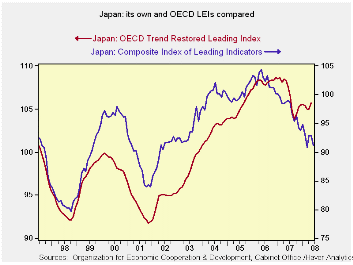 Global| Aug 06 2008
Global| Aug 06 2008Japan LEI Falls
Summary
Japan’s leading economic index fell in June after having a small uptick in May. Over three-months the index is higher but it is deeply weaker over 24-, 12- and 6-months. The OECD index that is not quite as up-to-date has been pointing [...]

Japan’s leading economic index fell in June after having a
small uptick in May. Over three-months the index is higher but it is
deeply weaker over 24-, 12- and 6-months. The OECD index that is not
quite as up-to-date has been pointing to strength since late 2007.
The Cabinet Office reported that the trend in the composite
coincident index points to a worsening of the economic cycle,
downgrading the view a month earlier that suggested a possible change
in the business cycle. The coincident index, which measures the current
state of the economy, fell sharply to 101.7 from 103.3, in line with
expectations. The leading index signals are not so clear cut with the
OECD’s and Japan’s own indicators pointing in very different directions
– a most unusual development.
| Japan's LEI and its trends | |||||||
|---|---|---|---|---|---|---|---|
| Levels | Growth (saar) | ||||||
| Jun-08 | May-08 | Apr-08 | 3Mo | 6Mo | 12Mo | 24Mo | |
| LEI | 91.2 | 92.9 | 92.8 | 1.8% | -5.5% | -8.0% | -11.5% |
| LEI: OECD | #N/A | 105.7 | 104.9 | 1.1% | 0.9% | -2.4% | -1.1% |
Robert Brusca
AuthorMore in Author Profile »Robert A. Brusca is Chief Economist of Fact and Opinion Economics, a consulting firm he founded in Manhattan. He has been an economist on Wall Street for over 25 years. He has visited central banking and large institutional clients in over 30 countries in his career as an economist. Mr. Brusca was a Divisional Research Chief at the Federal Reserve Bank of NY (Chief of the International Financial markets Division), a Fed Watcher at Irving Trust and Chief Economist at Nikko Securities International. He is widely quoted and appears in various media. Mr. Brusca holds an MA and Ph.D. in economics from Michigan State University and a BA in Economics from the University of Michigan. His research pursues his strong interests in non aligned policy economics as well as international economics. FAO Economics’ research targets investors to assist them in making better investment decisions in stocks, bonds and in a variety of international assets. The company does not manage money and has no conflicts in giving economic advice.






